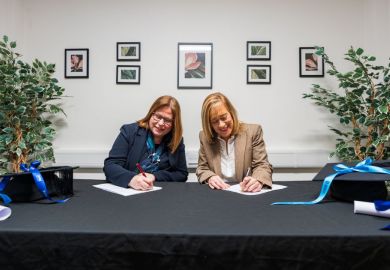England’s higher education regulator has made 10 institutions “subject to enhanced monitoring because of concerns about increased risk to their financial viability”, according to a report by the National Audit Office.
Meanwhile, the Office for Students needs to “communicate more effectively with the sector to build trust in its approach as a regulator”, the NAO, which scrutinises public spending for Parliament, also says in a report published on 9 March.
The NAO’s report looks at the regime for regulating the financial sustainability of English higher education providers, across the OfS and Department for Education, and is its first report on the OfS since the regulator came into existence in 2018.
On sector finances, the NAO reports that the “proportion of providers with an in-year deficit, even after adjusting for the impact of pension deficits, increased from 5 per cent in 2015-16 to 32 per cent in 2019-20” and that “financial stress is not confined to one part of the sector”.
“The number of providers of all types that appear to be facing short-term risks to their financial sustainability and viability is small but not insignificant,” it continues.
The OfS uses liquidity (a measure of a provider’s ability to continue to pay its bills) as an indicator of the risk of a provider failing, the NAO report notes, and “normally engages with providers if their liquidity falls below 30 days’ expenditure”.
During 2020-21, 33 out of 247 providers (13 per cent) “had forecast liquidity below 30 days – including at least one from each group” of institutions, grouped according to their entry tariffs.
“Short-term financial risks are dominated by Covid-19, but medium- and long-term risks are systemic,” says the NAO, highlighting issues such as pension costs and the need for cross-subsidy for research and for teaching of domestic students from international student fees.
And the NAO also says: “As at December 2021, the OfS had made 10 providers subject to enhanced monitoring because of concerns about increased risk to their financial viability. It was also engaging with a further 13 providers to understand their level of risk.”
Higher education providers “proved more resilient during the Covid-19 pandemic than government had feared”, the NAO says.
But the OfS found during the pandemic “that it needed stronger powers of intervention to protect students’ education when a provider is at material risk of market exit”, it adds.
Recommendations from the NAO include that the DfE should “make clear what tolerance the government has for provider failure, and the circumstances under which it would or would not intervene”.
Plus, the OfS should “communicate more effectively with the sector to build trust in its approach as a regulator”, says the NAO, which notes that the regulator’s “heavily data-driven approach to assessing financial risk does not yet have the full confidence of all providers” and that the organisation “does not routinely ask providers and sector stakeholders for feedback on its own performance as a regulator”.
Gareth Davies, head of the NAO, said: “Sector-wide issues that were causing financial stress before the impact of Covid-19 have not gone away and will continue to add pressure.
“The sector’s financial sustainability can have a profound impact on the value for money of education for two million students every year. The Office for Students should improve how it communicates with individual providers to build trust in its approach. As it matures as a regulator, it should also be making better use of its insights to reduce risks that could lead to financial failure.”
Nicola Dandridge, the OfS’ chief executive, said: “Universities and other higher education providers are responsible for running their businesses, and the OfS has always been clear that it is not our role to bail out those that would otherwise fail. Where a provider is facing financial challenges, we will intervene to ensure that it takes action to enable students to continue their studies. The data and other intelligence we routinely collect ensures we stay alert to risks and challenges for individual providers and the sector as a whole.
“We are carefully reflecting on the NAO’s recommendations on where we could do more in our engagement with universities, colleges and other providers.”
Register to continue
Why register?
- Registration is free and only takes a moment
- Once registered, you can read 3 articles a month
- Sign up for our newsletter
Subscribe
Or subscribe for unlimited access to:
- Unlimited access to news, views, insights & reviews
- Digital editions
- Digital access to THE’s university and college rankings analysis
Already registered or a current subscriber?








